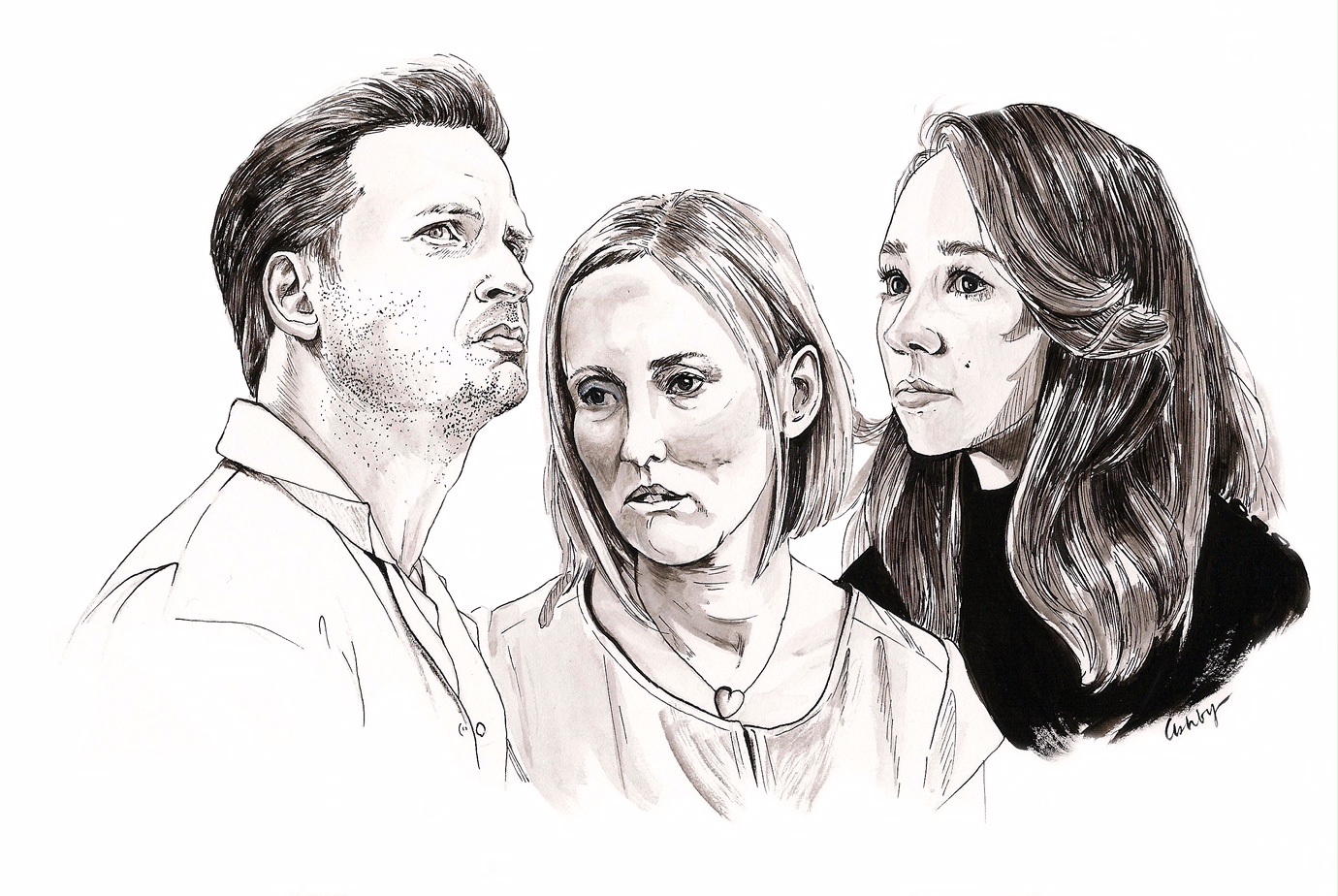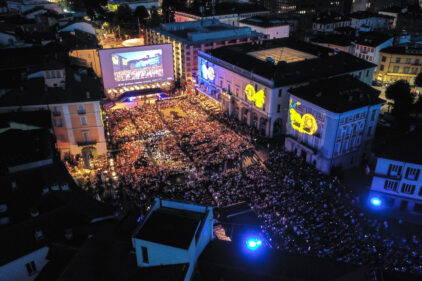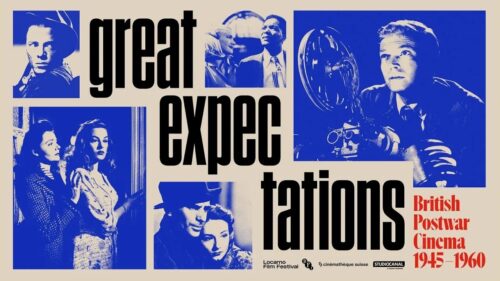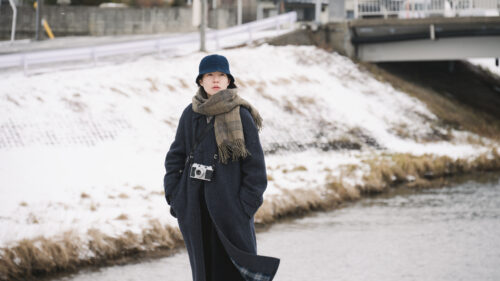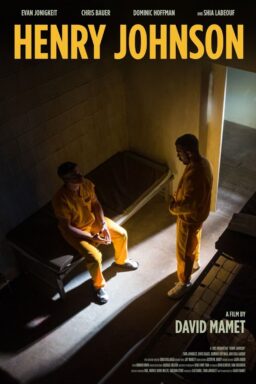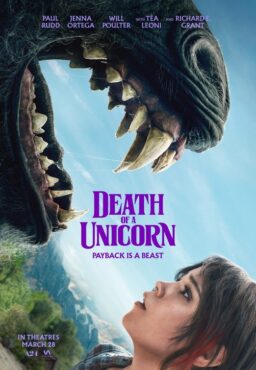We are pleased to feature an excerpt from the October 2016 edition of the online magazine Bright Wall/Dark Room. The new issue focuses on religion, faith, and doubt. In addition to Matt’s Brennan’s piece on religion on TV, there are also essays on “Groundhog Day,” Ingmar Bergman, “Captain Fantastic,” “Defending Your Life,” Tarkovsky’s “Nostalghia,” “Midnight Special,” “The Last Temptation of Christ,” “Last Days in the Desert,” “American Movie,” “Tommy,” “Top Chef/Cooked” and a look at the cinematic history of Joan of Arc. The illustration above is by Brianna Ashby.
You can read previous excerpts from the magazine here. To subscribe to Bright Wall/Dark Room, or purchase a copy of their current issue, go here.
I. The Shadow of the Spirit
Religion, whatever it is, is a man’s total reaction upon life.
– William James, The Varieties of Religious Experience (1902)
In America, the irreligious live in the shadow of the spirit. We hear the Torah at suburban bat mitzvahs; see churches fill with cots after the storm. We encounter stray prophets in city streets and visit rough-hewn chapels in tiny hamlets. We receive birthday cards with short verses from Scripture, printed on thin throwaway stock; listen to pastors proclaim their support for the candidates at both major parties’ conventions; read selections from the Qur’an and the Bhagavad Gita in Introduction to World Religions, fulfilling the requirement pass/fail. We experiment with new faiths as if trying on selves, eager to find one that suits us. We bow our heads and mouth “Amen.” We offer thoughts and prayers. We feel, in other words, as if the space around us is already occupied, so suffused with the radiance of other people’s convictions that our own seem to shrink in the shade.
To wit: I last attended Mass one faraway August, on the otherwise sparkling summer morning we buried my father’s father, and it had been so long since I’d had the Lord in my heart I instinctively sat at the back of the nave, as if playing the tourist in Chartres. With a slight hiss in her voice, a family friend urged me forward—You don’t know what you’re supposed to do at a funeral? was her implicit question—but as I slid into a pew much nearer my parents, I knew that my hesitation was a function of the Mass, not the funeral. In part, this was a political position—resistance to the religion that treated my sexual orientation (I sleep with men) as an abomination, my organizing experience (I had interned at Planned Parenthood) as a crime—but it was also a spiritual one: reluctance to disrespect my grandfather’s faith by performing Catholicism without crediting its truth content. Psalms suffocated me. Priests appeared medieval, no less a relic than the bones of some martyr displayed in the dim corner of a foreign church. And so, when I remained seated instead of accepting Communion, as row after row of the devout and the lapsed filed toward the altar for wafers and wine, I felt the eyes of those behind me settle on the back of my neck. Of the religion I’d been born into, I was now an outsider; part of the family but not in the fold.
It wasn’t until later that I came to understand the problems and possibilities of catechism, of ritual, of congregation—that I came to see faith and its absence as states of being unbound by sacraments and church rolls, Biblical passages and mellifluous hymns. I still do not believe in God, in the sense that one might imagine an unimaginable figure creating and ordering the cosmos, but I am no longer convinced that this constitutes a barrier to certain varieties of religious experience. If religion is, as James suggests, “a man’s total reaction upon life,” then it is the reaction that sustains the religion, and not the reverse.
This is the work of The Leftovers, The Americans, and Rectify, three TV series that treat the total reaction, and not simply the doctrine—three TV series whose most characteristic episodes come closer to reflecting the varieties of religious experience we encounter in the course of life than any sermon I’ve ever heard. To wit: On the otherwise sparkling summer morning we buried my father’s father, I had the same sense that life’s end is what gives it its shape—and that this is its most sorrowful feature—as those standing in line for Communion. I need no wafer, no wine, to see its radiance, or for that matter, the shadows on its margins.
II. No Room at the Inn
When all is said and done, we are in the end absolutely dependent on the universe.
– William James
Since the night of the second “miracle” in Miracle, Matt Jamison’s routine is the same. He records his wife sleeping and watches the result over breakfast, searching for signs she’s returned. He listens to The Bellamy Brothers’ “Let Your Love Flow,” empties her catheter and brushes her teeth; he wheels her to church at the same time each day and brings her to the same store, lifting her into and out of the car with the same strenuous effort. He fills her feeding tube and sits next to her in silence with his microwavable meal, prepares for bed and sets his laptop to record again, perched there in case it should happen. “It” is Mary’s emergence from the persistent vegetative state in which she’s remained, with one inexplicable exception, since the Sudden Departure. “It” is proof that the universe is listening, against the preponderance of evidence that it is not.
Set three years after the abrupt disappearance of 140 million people, a sort of Rapture without reason, The Leftovers is run through with all manner of religions—a silent, chain-smoking, white-clad memory cult; at least two hugging healers, or perhaps snake-oil salesmen; flagellants, Episcopalians, atheists—but the series is, in the strictest sense, agnostic. It not only admits that the reason for the Sudden Departure is unknown. It also suggests that the reason is unknowable, that the meaning in religion stems not from the particulars of one or another creed, but from the need—fundamental and universal—to explain, to understand, to narrate. In The Leftovers, which imagines our own world in extremis, religion is not a set of answers so much as a way of framing the question: What is the purpose of pain, of loss, of grief, of despair? And what happens if we conclude that there is none?
For Matt (Christopher Eccleston), if not for Mary (Janel Moloney), the ritual that begins “No Room at the Inn” (Episode 205) is, on the face of it, an attempt to recreate the circumstances of that inexplicable exception—the night she came back to consciousness—but in truth it’s an attempt to reduce the unfathomable to a few tangible facts. The song, the store, the meal: These are his sacraments, his communion and confession, transforming into human scale the immense and inscrutable divine. An Episcopal reverend, Matt is adamant in his belief, as my mother says of any event more tragic than a missed flight, that “everything happens for a reason”; he and Mary relocate to Jarden, Texas (“the Jarden of Eden”), after all, because it is the largest town in the United States (pop. 9,261) not to experience a single Departure, and must therefore be part of God’s plan.
In point of fact, “No Room at the Inn”—a brutal, poetic retelling of the Book of Job—militates against this interpretation. It is so full of cruelties and chance intercessions that it nearly segues from a portrait of suffering into an admission of disbelief: Cast out of Jarden after an attack by a “stranded” motorist, Matt and Mary wander the tent encampment that’s sprouted up outside the town, encountering smugglers and fanatics and thieves, the desperate dregs of a social order bereft of reasons to sustain itself. And yet, the fact that Matt’s faith never wavers—the fact that he returns to the encampment to repent, stripped bare and in stocks, after securing Mary’s safe passage—turns out to be the perfect emblem of the series’ agnosticism.
The Leftovers recognizes that religion itself, if not the phenomena it seeks to interpret, is by definition at human scale, responding to catastrophes and changing circumstances. It is the need to understand, and not any one understanding, that lashes the varieties of religious experience together.
In this sense, my mother’s insistence that “everything happens for a reason” is not, I suspect, a profession of faith—as far as I know, she stopped attending Mass around the same time that I did—but an acknowledgement that we are indeed dependent on the universe, subject to reasons we cannot see, reasons that remain theoretical. The power of religion, then, is no more and no less than that which we ascribe to it, bearing the marks of both our weaknesses and our strengths; it is we who determine the purpose of pain, of loss, of grief, of despair; it is we who narrate our stories. We might endure humiliation, submit to silence, or embrace our fellow man, but each of these, in the final estimation, derives from the same hope that imbues Matt Jamison’s ritual. After all, as The Bellamy Brothers’ song begins, “There’s a reason.”
III. Born Again
The real witness of the spirit to the second birth is to be found only in the disposition of the genuine child of God. – William James
It was Mom who promised at our baptisms to raise us in the church, and though she’s been known to lament her “failure” on this front—you will not meet three worse Catholics than my brother, my sister, and me—I tend to see our independent streak as the result of effective parenting. When the three of us declined, en masse, to continue CCD, having decided that the two hours each Wednesday we were devoting to indoctrination were better spent playing video games or chipping golf balls in the yard, her protestations were pro forma. I think she knew, this woman who always told us to hide when she saw the Jehovah’s Witnesses coming up the walk, that when it comes to religion, strong-arming will only get you so far.
Though the roles are reversed, The Americans‘ Paige Jennings (Holly Taylor) and her parents, Philip (Matthew Rhys) and Elizabeth (Keri Russell), confront much the same question: Where is the line between impressing your values on your children and impinging on their own? The stakes in The Americans are much higher, of course—as far as I know, my parents have never been Soviet spies—but the series’ interest in the intersection of the personal and the political, the secular and the spiritual, hinges on the emotional realism from which its dramatic action is built. Amid the reflective quiet of “Born Again” (Episode 306), in which Paige’s own baptism is not the sole expression of ardent belief, The Americans reconstructs the gentle tension I felt at my grandfather’s funeral. “Paige,” Pastor Tim (Kelly AuCoin) says as he prepares to immerse her, “this is your most defiant act of protest yet.”
If Paige’s commitment to the church is an adolescent’s rebellion, it’s not of the softer sort, the fleeting fad of the sullen teen determined to get a rise from her parents. She is, to use James’ phrase, “the genuine child of God,” and it is the force of her faith that concerns Elizabeth: This is not a phase to endure but a problem to wrestle with, the atheist’s daughter embracing “a fantasy world” her mother long ago came to despise. That The Americans itself is not so simplistic is among its foremost merits, though, and when it comes to the varieties of religious experience, as to the Iron Curtain between capitalism and communism, the series treats ideological boundaries as inherently porous, contingent on particular people, places, and times. When their neighbor, Stan (Noah Emmerich) brings his girlfriend (Callie Thorne) to dinner, for instance, her defense of EST (Erhard Seminars Training) is also an argument for coexistence (“Listen, whatever works! Everybody’s got their own thing”), one that’s reflected in those seated around the table. In “Born Again” an American evangelical born to Soviet atheists describes her baptism to a self-help devotee and an anti-communist FBI agent, and the only intimation of the divisions among them is the tight crease of Elizabeth’s smile.
This is, to me, at the heart of the episode, and of The Americans writ large: That achieving peace, familial and global, is not a function of accepting another’s beliefs, but of granting that the act of belief, broadly speaking, adheres to no known borders. In the series of conversations with Paige that structures “Born Again,” Philip and Elizabeth confess that their opposition to her baptism coincides with a certain pride—Paige, signing anti-apartheid petitions and protesting nuclear proliferation alongside Pastor Tim, is a person of conviction, an apple not so far from the tree. And isn’t this the message we want to impress upon our children, the blessing we hope to receive from Mom and Dad? The reassurance that being part of the family transcends being in the fold?
When we grow apart from our parents’ traditions, we are no less the genuine child than we were when their world contained the whole of our own. In the time since I decided to leave the church in which my mother promised to raise me, I have abandoned other aspects of the life she and Dad built—leaving the Boston suburbs for Los Angeles and New Orleans, exchanging the affluence of a career in business for the freedom of one in the arts—but I am still, unmistakably, cut from the same cloth. It’s true of Paige, too. At the conclusion of “Born Again,” Elizabeth brings her budding progressive to the neighborhood in which she and Philip once fought for civil rights, and though Paige at first interprets it as a critique of her faith, it turns out her mother is keeping it. “I brought you here because I wanted you to know,” she says, “that I’m more like you than you think.”
IV. Plato’s Cave
The gods we stand by are the gods we need and can use, the gods whose demands on us are reinforcements of our demands on ourselves and on one another. – William James
Daniel Holden (Aden Young) kept the faith, kept it for well nigh two decades, in fact, but when he reenters the world in the first season of Rectify, he of course begins to see it anew. Released from death row after his conviction in the rape and murder of his high-school sweetheart is vacated—the result of new DNA evidence his attorney (Luke Kirby) presents on appeal—the soft-spoken Daniel is not dissimilar, in his way, from Matt Jamison or Paige Jennings: a genuine child of God struggling toward meaning even as life’s cruelties and Cold Wars seem to push it away. Nearsighted after 19 years in his cell’s close quarters, Daniel asks his mother, Janet (J. Smith-Cameron), to bring him to the optometrist, and his new specs become a profound metaphor for a kind of revelation. It’s as if, he says in the immaculate “Plato’s Cave” (Episode 104), “I’ve been looking at shadows on a cave wall.”
In the course of an hour so crisp, so simple, that it strains belief—I cried watching him marvel at the magnitude of a Georgia Wal-Mart, for Christ’s sake—Rectify reconsiders the philosopher’s parable with reference to TV screens and a news crew’s camera, Flannery O’Connor and The Divide Comedy, destabilizing in the process Plato’s distinction between perception and concept. For if Rectify, The Americans, and The Leftovers are composed of shadows projected on a wall, mere images masquerading as the truth, how is it that each seems so finely attuned to the rhythms of worship, the filaments of conviction, the terror of being, and of nothingness besides? How is it that this low form, television, came to be the medium through which such remarkable stories of faith and faithlessness are told?
What I want to suggest here is this: That it is no coincidence, at a moment in which the center no longer seems to be holding, that the three finest dramas on American television are the three that treat religion as more than a set of moral precepts or strange rituals. That the diamond-like core of the subject, impervious except to itself, is not the doctrinal difference between Catholicism and atheism, the mainline church and the cataclysmic cult, but the search for stories, philosophies, psalms, or scientific theories that approach an explanation for the inexplicable, an understanding of the misunderstood. That the nature of the medium, unspooling in increments across months or years, allows for a fair approximation of the varieties of religious experience, the evolving states of being—desperate, ecstatic, doubtful, convinced—from which belief and its absence are born.
What I want to suggest here is this: That my relationship with religion is one in which I now see the forms of faith I’ve adopted and abandoned as a reflection of my evolving reaction upon life, the desire for my gods, whatever they may be in a given moment, to reflect my demands on myself and on others.
And so “Plato’s Cave,” one of the most gorgeous, humane, wholehearted examples of the art form I’ve ever seen, culminates with a conversation in a Georgia field suffused with a radiance I recognize. After helping her prepare for her congregation’s Jubilee, Daniel and his sister-in-law, Tawney (Adelaide Clemens) stroll the grounds in the golden hour, the light immanent, expectant, full. He is a skeptic, she a devout, but in the course of their conversation, the space between them closes until it almost disappears.
“I can see and feel God in all things,” she remarks.
“Thomas Aquinas,” Daniel replies. “He believed that supernatural revelation was faith, and natural revelation was reason. That the two are not contradictory, but complementary.”
I do not know, perhaps cannot know, if this is the truth, but of all the stories I have heard or will hear, it is the one that fills me, as Tawney says, “with indescribable joy.” In this moment, after all, neither shrinks in the shade. They’re both in the sunlight, side by side at last.
